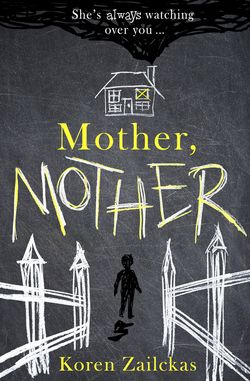Читать книгу Mother, Mother: Psychological suspense for fans of ROOM - Koren Zailckas - Страница 9
WILLIAM HURST
ОглавлениеTEA AT THE White House was drawing to a close. It was time for Will’s grand finale. He told Josephine that on April fourteenth, he’d gone to see a play called Our American Cousin.
“During intermission, my bodyguard left the playhouse to get trashed with my driver,” Will said.
“How do you know that word?”
“What word? Trashed? I don’t know. Violet says it. It means you’ve drunk so much alcohol that you spin without moving.”
When Josephine didn’t approve of something, her eyes went as slitted as Will’s old plastic dinosaur toys.
“Anyways, while my driver was drinking alcohol, an actor-slash-spy shot me in the back of the head. Right here.”
Will staggered to the floor. All tea parties at the White House ended this way: with Will gasping, moaning in unimaginable pain, clutching his wound, and letting his eyelids go fluttery. Like Rose before him, Will relished his acting skills. Usually he could make his mom laugh, no sweat. But this time, Josephine didn’t crack a smile or teasingly try to catch him breathing in the grave. No matter how much she claimed she wanted to return to their routine, last night hadn’t loosened its hold on her. She might have cleaned up the splattered risotto and mopped the blood off the floors, but the kitchen still had an air of something not quite right.
Will opened his trying-hard-not-to-quiver-because-he-was-dead eyes. “What’s wrong?” he asked. “Did I do a bad job?”
“You were fine,” Josephine said. “Although you might have placed more emphasis on repealing slavery and the Gettysburg Address. Tea at the White House is a school lesson, remember? It’s not an acting exercise. We don’t just do this for the drama of it all.”
Will was crushed. He let his beard fall to his chest like a hairy necklace. “Sorry, Mom. Maybe I shouldn’t die next time?”
“It’s all right if you die.”
“I don’t need to.”
“William, I don’t have the energy for this today. You can die, okay? It’s fine by me. Maybe just don’t make such a big to-do about it.”
His mom’s gaze drifted to the window. Outside, the mailman idled in his doorless truck. He had a third-trimester-sized belly and wore shorts, regardless of season or weather. Will noticed he always left the mailbox ajar.
“People on the Internet say Abe Lincoln used marijuana.”
“Marijuana?”
“People said he was a homosexual too.”
“Oh Will, don’t be ridiculous. I really don’t have the time for this today. If we don’t get in the car now we’ll be late for the hospital.”
Ridiculous. A describing word, reserved for people and things you didn’t have to take seriously.
What was wrong with Will? He thought about that question as he climbed into the backseat of his mother’s burnt-red sedan. Ultimately, he came back to his autism, the root of his wrongness. All the Asperger’s books his mother left lying around the house said that people like Will lacked empathy. But Will didn’t think that was his problem per se. If anything, he picked up too many signals from other people. So much like a crowded radio spectrum, he was, that it was hard to get a clear reading on any one person (including himself). Every human interaction was static-ridden. Each conversation crackled.
In the rearview mirror, Will glanced at Josephine’s profile. He studied her hooked lashes and the perfect brushstroke of her nose. It was probably hard for her, faking a distant and controlled expression for the sake of Will’s comfort, but he saw her white knuckles on the steering wheel.
She sighed as she reversed past the mailbox. “So he did leave it open again. Will, will you jump out and grab the mail for me?”
The stack of mail in hand, Will noticed a seal on the back of an envelope for Violet that caught his attention. There was a musical symbol—a treble clef, he knew from his mother’s piano instruction—pressed into the dark pink wax. There was little else on the envelope, except for Violet’s name, the Hursts’ address at Old Stone Way, and a nameless New York address in the upper left-hand corner: 130 Seventh Avenue, #123.
When she slowed for the tollbooth at the Poughkeepsie bridge, Will glanced at the passenger seat, where the mail stuck out of his mother’s boxy ostrich-skin purse. It suddenly became clear to Will why the envelope looked so familiar: Missing could be either an adjective or a verb. And the New Yorker Violet knew was his lost sister, Rose, who used to put a wax kiss on everything.
